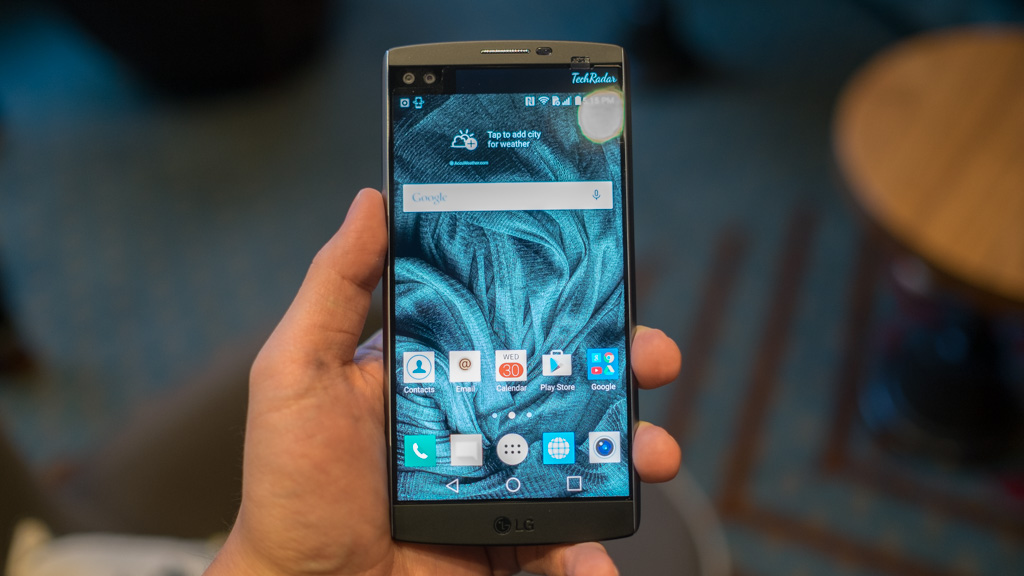LG V10 takes on BlackBerry with enhanced mobile security
Enhanced data protection and device management

You might think that LG is making a play for the consumer market with the V10 and its selfie-centric dual front-facing cameras and dual displays. However, the LG V10 isn't all about fun, and the handset packs in security features that makes it appealing to business users.
In addition to supporting Google's native Android for Work, the V10 comes with LG Gate, an enterprise security suite that includes virtual private network (VPN), enhanced email support, data encryption and mobile device management (MDM). With the LG Gate software suite, the V10 can help business users safeguard their data, while IT departments can have greater peace of mind with Bring Your Own Device (BYOD) policies.
In the Android space, LG Gate's closest competitor is Samsung Knox. Both services are designed to make it easier for organizations to adopt LG and Samsung's Android phones over competing smartphones from Apple, BlackBerry and Microsoft.
Enhanced email and data encryption
Rather than using simple Exchange ActiveSync (EAS) connections for emails, LG Gate adds additional layers of permissions on the V10. LG Gate supports enhanced EAS features, allowing users to send encrypted emails and place forwarding and reply restrictions on messages.
Additionally, LG Gate allows you to set out of office messages, send and respond to calendar invitations, synchronize tasks, lookup your global address list with photos and enforce password policies.
To protect your phone's content, LG Gate can secure data on devices and SD cards using a FIPS 140-2 certified crypto module or AES 256 bit algorithm. The FIPS standard support means that non-military government employees and contractors can consider the LG V10 as their next work phone.
VPN and MDM
If you're concerned about data transmission over public networks, the LG V10 supports VPN using the FIPS 140-2 certified crypto module. LG is partnering with CheckPoint, Cisco, Fortinet FortiGate, Juniper, NETGEAR ProSafe, SonicWALL, StrongSwan, ZyXel, StoneSoft, AT&T GW and Windows Server for VPN support.
Sign up to the TechRadar Pro newsletter to get all the top news, opinion, features and guidance your business needs to succeed!
LG is working with partners like AirWatch, SAP and FiberLink for MDM services to make it easier for IT departments to deploy and manage LG smartphones. LG Gate MDM allows IT administrators to manage applications, security, email and EAS policies, VPN and Wi-Fi configuration. Rival BlackBerry recently acquired Good Technology to boost its MDM efforts.
IT department can also enable select aspect of the phone's hardware, including Bluetooth, camera, Wi-Fi, microphone, SD card support and NFC for added security. For more secure work environments, these features can be disabled. IT can also turn off the phone's ability to take a screen capture or tether.
In the event that users lose the LG V10, IT administrators can lock or wipe the device remotely. Additionally, to protect the device and its content, a strong pass code policy can be made mandatory.
The LG V10 comes with two different methods to unlocking the phone. In addition to a fingerprint reader positioned on the rear of the phone, LG also has its own Knock Code software.
A different spin on consumer features
LG claims that the same consumer-centric hardware used on the camera for capturing stunning photos and vivid videos could turn the LG V10 into a better business tool.
For example, the three built-in microphones used to reduce background noise when recording video can also be used to record crisp audio notes during meetings. LG says that its Audio Zoom 2.0 technology can focus the microphone to a specific sound, while its Wind Noise Filter can reduce background noise. Users can use an external microphone for even better audio recordings.
Additionally, the Dura Guard stainless steel frame and Dura Skin materials that protect the back of the phone from scratches can help the phone survive drops and impacts. The V10 is a MIL-STD-810-G tested device for drops and shock, and LG says it can survive drops at different angles at a height of up to 48 inches.
- Read our review of the LG V10